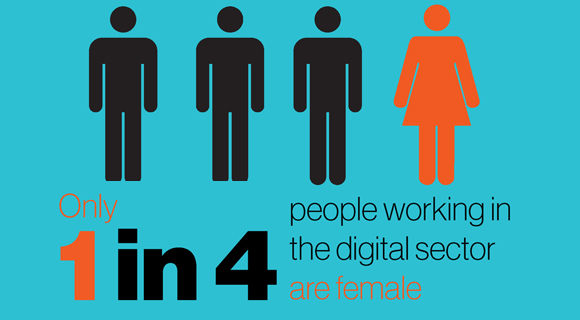As you may know TV has now gone digital across the UK. Signalling the end to five terrestrial channels and balancing that TV aerial on your head to get that clear picture! In its place comes a wealth of TV channels and information services at the touch of a button. Going digital is arguably the biggest thing to hit our TVs since introducing colour, but similar significant changes are also sweeping across the digital and creative sector as a whole. So what does this mean for the sector and its workers going forward?
While the digital switchover has been a staged and gradual process, latest findings from the UK Commission for Employment and Skills show that the digital and creative sector is in the process of rapid growth and change. With the international market for IT and telecoms growing four times faster than the market for manufacturing, the digital revolution has really taken off. No longer constrained by slow dial-up connections, the sector now offers high-speed broadband at your fingertips, not to mention a booming digital music industry.
With the spread of IT and telecoms raising the level of capital investment in technology across all sectors of the economy, the UK also has the largest creative sector in Europe and is one of the main players in producing TV and radio content.
But making this transition has been difficult for the sector, as digitisation has swept through the creative industries like a power surge, crashing TV advertising sales, and paving the way for a growth in online tools and products. The workforce too, has shifted with a loss of jobs in the creative industries moving workers into more freelance positions, while some areas of the existing workforce struggle to exploit new digital technologies and create more innovative products. Similarly, in IT and telecoms roles, recruiters have noted that a lack of qualifications, experience and technical abilities in areas such as cloud computing is hard to come by.
The need for industry specific skills is also a key recruitment challenge in the sector. Despite an abundance of graduates in the creative industries, there is not an abundance of experience to match, and many employers in the sector are looking for applicants that are job-ready. On the digital side, there is a short supply of young professionals and women, resulting in an ageing workforce not capable of meeting future demand.
But it’s not all bad news, as the digital and creative sector has been working hard to address these issues. Employer Investment Fund initiatives have allowed Sector Skills Councils in the digital and creative sector to develop innovative ways to deal with some of these challenges. This includes a Computer Club for Girls scheme to attract more young women into computing and technology roles, and an ITMB degree which is tailored to the exact needs of technology recruiters.
But what more can be done? There are huge gains to be made by growing specific skills through taking on more apprentices at a higher level. Compared to the national average, apprenticeship take up in the digital and creative sector is low. Debbie, a technical manager based in Wales explains the benefits of working with apprentices.
“The apprentices have thrown themselves into the work and integrated themselves into the team very well. They bring freshness to the work environment; their enthusiasm is infectious.”
In line with the need for innovative products to meet demand, the sector also needs to find innovative ways to meet their skills shortages if traditional methods falter. This may include taking on re-entrants to the labour market following career break, early retirement or unemployment. Similarly, work-based training in the sector is low so it may be more appropriate to consider new ways to develop staff, such as targeted training programmes. Along with training in technical skills, there is a strong need for management capabilities in order to take advantage of new business models.
At first the digital switchover was viewed by many as a laborious process, but through recognising the benefits of change and adjusting accordingly digital TV has become a reality. The same will be true of the digital and creative sector; despite its significant role in the economy, it needs to make changes now if it wants to develop the skills needs of its workforce and attract the brightest talent to meet future demand.
So is the sector ready to make the switchover?
Sector Skills Insights - Digital & Creative

2 comments
Comment by my jan posted on
It's a good post.
Comment by Murat Aydin posted on
Great article. Change is not always progress. In this situation it did however lead to great improvement.